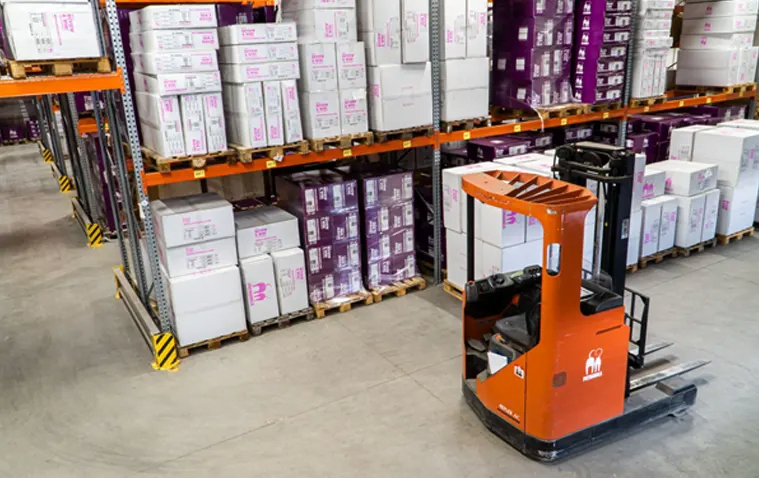As supply chains become more complex and expand beyond geographic borders, manufacturers need greater visibility into their supply chains. Visibility at the granular level enables them to control the supply chain better. And for this, product serialisation is essential.
Serialising products makes it possible to trace them throughout their journey – right from the source of raw materials all the way to the store shelf. It also helps ensure product authenticity, prevents counterfeiting, and makes recalls easier.
In the long term, new digital capabilities for serialisation empower companies to control their inventory and leverage new opportunities to gain buyer confidence, increase repeat sales, and ultimately boost customer retention.

What is Product Serialisation?
Product serialisation is about making each product or item identifiable. More profoundly, the goal is to make every product unit traceable and bring greater transparency into the supply chain.
As such, the process involves assigning a unique identifier or code to each product. For this, producers may use one of several available technologies and serialisation software like QodeNext.
Technologies that Power Product Serialisation
Today’s manufacturers can choose from a plethora of digital technologies to serialise their products and achieve the associated manifold benefits. Three of the most popular technologies in this space are:
QR Codes
A QR code is a two-dimensional version of a barcode. It enables manufacturers to provide more information about their products to customers, such as serial numbers, warranties, etc. Simply put, QR codes allow customers to identify a product and even ascertain its authenticity.
RFID Tags
RFID or Radio Frequency Identification, a popular serialisation technology, involves encoding digital data onto RFID tags or “smart labels”. An RFID reader then captures this data via radio waves to allow product tracking and confirm its authenticity.
Unlike regular barcodes, which need to be read by a line-of-sight optical scanner, RFID tag data can be read even outside the line-of-sight. This is a considerable advantage, precisely why RFID is popular for product tagging, theft prevention, and fleet tracking.
RFID tags can also be paired with the Internet of Things (IoT) sensors, blockchain technology and powerful analytics software. Such integration enables manufacturers to collect granular-level data to:
- Get detailed visibility into the supply chain
- Improve operational efficiency
- Track product provenance from the factory floor to the shop floor
- Prevent fraud
NFC Tags
NFC (Near Field Communications) tags or “chips” allow the transfer of digital information with a tag reader device, such as an NFC-equipped smartphone. Unlike RFID, NFC works only at short ranges of typically no more than 1.5 inches.
The Benefits of Serialisation
At a superficial level, serialization seems to be no more than assigning a unique identifier to each product. But a more in-depth look reveals that the process garners several benefits for every stakeholder involved in a supply chain.
Improves Supply Chain Visibility
Supply chain shocks in the post-COVID era have shaken up economies and societies worldwide. In this scenario, visibility is crucial to quickly identify and address problem areas and minimise the impact on producers and consumers.
Serialisation helps increase this visibility. By tagging or identifying their products with unique codes, companies can accurately track each item as it moves through the supply chain. This lets them know where each product is at all times and increases overall transparency across the supply chain.
Simplifies Product Recalls
Product recalls are fairly common if the quality falls below a certain expected threshold. Poor-quality products can affect a brand’s reputation. And for certain product types like vehicles or pharmaceuticals, it can even endanger human lives. In such cases, product recalls are not only expedient but necessary. Serialisation makes it seamless for manufacturers to know:
- The exact status of their products
- Which distribution channel are these items are currently in
- If they have already reached customers or are still en route
This information assists them in quickly recalling products and minimising damage – to the brand and to customers.
Maintain Authenticity and Prevent Counterfeiting
Counterfeit products damage a company’s reputation and bottom line. They are also unfair to consumers who feel cheated by low-quality knock-offs. Serialising provides a robust anti-counterfeiting method to prevent counterfeiting.
Anti-counterfeiting technology raises red flags if there is an attempt to clone a product and sends notifications so the company can take quick action to curb the practice.
Assess Product Performance
Serialisation allows brands to identify and track product performance. They can collect data at each step of the supply chain and use it to assess the product’s performance in terms of sales and revenues.
Further, serialisation technology allows them to collect crucial data that provides key insights into the entire product journey. They can leverage this data to forecast product demand in order to:
- Procure the necessary raw materials for the next manufacturing cycle
- Estimate the stock supplied to each distribution channel
- Calculate how much has been sold
- Forecast how much they need to sell
- Determine if they can fill market supply gaps with their offerings
Conclusion
As elucidated above, serialising enables companies to track and trace their products from production through to the consumer. They can even recall products if necessary and create accurate forecasts to grow the business. These capabilities make it easier to authenticate products and prevent counterfeiting.
Assigning unique identities to products also creates marketing, promotions, and branding opportunities. Not to forget that customers can participate in loyalty programmes through bar codes and NFC chips – enabling brands to engage with their audience, earn customer loyalty, and boost customer retention.
Effective serialisation starts with cutting-edge technology. QodeNext’s serialisation software automatically serialises products to provide complete end-to-end visibility. It enables manufacturers to effortlessly track their product footprint, control counterfeiting, and comply with local and international regulations.
Contact us to know how our proprietary algorithm simplifies serialisation and helps companies minimise losses and optimise profits.







